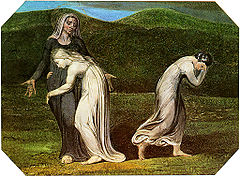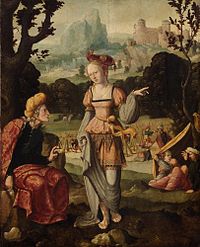- Naomi (Bible)
-
Naomi (נָעֳמִי "Pleasant; agreeable; my sweet", Standard Hebrew Noʻomi, Tiberian Hebrew nåʿå̆mī) is Ruth's mother-in-law in the Old Testament Book of Ruth. Later, she called herself Mara, or "bitter" (Ruth 1:20-21), she said to the women on Bethlehem, "Do not call me Naomi call me Mara (מרה), for the Almighty has dealt very bitterly with me," referring to the death of her husband (Elimelech) and her two sons (Mahlon and Chilion). In Ruth 1:13, she had said to her two daughters-in-law "it is exceedingly bitter to me for your sake that the hand of the LORD has gone out against me," (ESV), but the NIV translates this as "It is more bitter for me than for you..." which indicates that Naomi is indeed bitter. Barry Webb points out that there is both an objective element in her life being bitter (bereavement, dislocation and poverty), as well as a subjective element - the bitterness she feels.[1]
Naomi had with her a faithful daughter-in-law named Ruth who decided to follow her, while Orpah, her other daughter-in-law, chose to go back to Moab. Ruth marries Boaz and they have a son, whom Naomi cares for, and so the women of the town say "Naomi has a son" (Ruth 4:17). In this way, the book can be seen to be Naomi's story: Gregory Goswell argues that Naomi is the central character of the book.[2] The son in question was Obed, who later became the grandfather of David.
Barry Webb argues that in Ruth 1, Naomi's "perception of her condition" is "distorted by self-absorption," but that Ruth plays "a key role in her rehabilitation."[3] Webb also points out Naomi's "feminine scheming" in forcing Boaz's hand.[4] Abraham Kuyper, on the other hand, asserts that "Naomi has such innate nobility of character that she immediately elicits from us our most sincere sympathy."[5]
Yitzhak Berger suggests that Naomi's plan was that Ruth seduce Boaz, just as Tamar and the daughters of Lot all seduced "an older family member in order to become the mother of his offspring." At the crucial moment, however, "Ruth abandons the attempt at seduction and instead requests a permanent, legal union with Boaz."[6]
References
- ^ Barry G. Webb, Five Festal Garments (Leicester: Apollos, 2000), 42.
- ^ Gregory Goswell, "What's in a Name? Book Titles in the Latter Prophets and Writings", Pacifica 21 (2008), 8.
- ^ Webb, Five Festal Garments, 43.
- ^ Webb, Five Festal Garments, 38.
- ^ Abraham Kuyper, Women of the Old Testament (Grand Rapids: Zondervan, 1941), 89.
- ^ Berger, Yitzhak (2009). "Ruth and Inner-Biblical Allusion: The Case of 1 Samuel 25". JBL 128 (2): 268. Emphasis original.
Categories:- Hebrew Bible people
- People from Bethlehem
- Book of Ruth
- Women in the Bible
Wikimedia Foundation. 2010.


